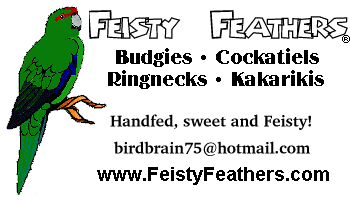

What birds can talk? Unfortunately, many people use this to determine what type of
bird they should purchase. It doesn't matter. Birds are not decorations, but highly
sensitive and emotional pets. Some of the top talkers are: budgies, ringnecks, amazons,
African greys, quakers, mynas, and kakarikis. Some birds will never talk, some only talk
when no one is around, others only talk when they feel like it. Whistlers include: greys,
rosellas, and cockatiels. Whistlers can talk, but prefer trills, beeps, and whistles.
What do I feed my bird? Birds require a balanced diet to avoid health problems later
on. Carrots (with the tops), beans, corn, peas, apples, oranges, kiwis, bread, squash, Crazy
Corn, parsley, and pasta are some good foods. You can feed birds seed, if you give them
supplements as well as all the other things I mentioned. Pellets are a good substitute for
seed, but other foods should be fed as well.
The seed I buy says it's supplemented. Isn't that okay? No. The supplements on seed
are often sprayed or coated on. Since birds shell their seed before eating it, none of these
vitamins will be eaten. Nekton is a good vitamin which can be added to the soft food.
Should I clip my bird's wings? Yes. Clipping prevents injury and escape. Don't
worry, it does not hurt the bird. If you don't know how, take your bird to a vet who can show
you. Both wings should be clipped. Birds with a one wing clip can still fly but are way
off balance. This can lead to health problems and the bird could fly into things and hurt
itself.
What type of cage do I buy? Here are my rules for cages: They should have many
horizontal bars. They should be square, not round, and wider than they are tall. Large door
for easy access. The smaller the bird, the larger the cage needs to be proportionately (finches
need huge cages). The bars should be close together so that birds can't get their heads
through. Uncolored newspaper (or white paper) should be put at the bottom. Never use
corncob litter, it grows bacteria and fungi. Find a cage that is easy to clean and service.
Buy the biggest cage you can afford.
What things are toxic/dangerous to my birds? Teflon, avocado, smoke, chocolate, the
pits of fruits, that stuff that's supposed to make your house smell nice (that you plug into the
wall), electric wires, ceiling fans, open containers of water (toilet), poisonous plants, open
windows, cats, dogs, young children, irresponsible children, and aerosols.
How can I
tell if my bird is sick? Birds hide signs of illness until their about to drop dead. If
you bird looks sick take it to an avian vet immediately! Symptoms include: lethargy,
runny nose, sneezing, abnormal breathing, trouble perching, too quiet, sitting on bottom of
cage, etc. Never rely on stupid home remedies or store-bought drugs. You are not a
veterinarian! You could kill your bird very easily by giving them the wrong drug!
I don't have time to play with my bird! How do I bond with it? Birds do require a lot of attention. The best way to bond with your bird is just to spend time with it. Keep a perch in the livingroom so it can be a part of the family. Let it sit on your shoulder while you watch TV or surf the net. Birds just like to be with you. You don't have to "take them for a walk" or "play" with them like you would a dog. Just let them be with you often, and give them some good head scritches!

© 1997 birdbrain75@hotmail.com